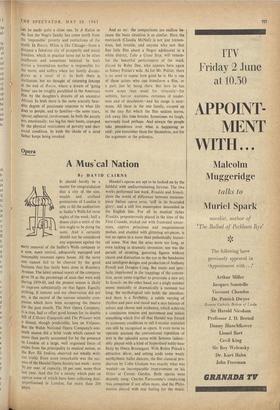er a
A Mus'cal Nation
By DAVID CAIRNS
IT should hardly be a matter for congratulation that a city of the size. wealth and civilised pretensions of London is able to fill the auditorium at Sadler's Wells for most nights of the week: half a dozen cities a tenth of the size ought to be doing the same. And it certainly should not be considered any argument against the early removal of the Sadler's Wells company to a new, more central, adequately equipped and reasonably resonant opera house. All the same one cannot fail to be cheered by the good business that has lately been done in Rosebery Avenue. The latest annual report of the company gives 78 as the percentage of seats that were sold during 1959-60, and the present season is likely to improve substantially on that figure. Equally striking, if rumour and my observation did not err, is the record of the various minority com- panies which have been occupying the theatre for the past month. The New Opera Company, it is true, had to offset good houses for its double bill of L'Ileure Espagnole and The Prisoner with a dismal, though predictable, loss on Vol pone. But the Welsh National Opera Company's one- Week season did a brisk trade which cannot be more than partly accounted for by the presence In London of a large, well organised force of exiles from the principality (a musical nation, as the Rev. Eli Jenkins observed not wholly with- out truth). Even more remarkable was the suc- cess of the Handel Opera Society last week : some 70 per cent. of capacity, 10 per cent. more than last year. And this for a society which puts on operas some of which have been collecting dust, unperformed in London, for more than 200 years. Handel's operas are apt to be looked on by the faithful with undiscriminating fervour. The two works performed last week, Rinaldo and Semele, show the world of difference between museum- piece Italian opera seria, 'stiff in its brocaded glory', and a still live masterpiece descended in the English line. For all its musical riches Rinaldo, preposterously placed in the time of the First Crusade, tricked out with frustrated sorcer- esses, captive princesses and magnanimous pashas, and studded with glittering set-pieces, is not an opera in a more than pedantically histori- cal sense. Not that the arias seem too long, or even lacking in dramatic invention; nor was the parade of strutting, gesturing figures without charm and distraction to the eye in the handsome and intelligent designs and production of Anthony Powell and Douglas Craig. But music and spec- tacle, imprisoned in the trappings of the conven- tion, never come together to procreate a new art. In Semele, on the other hand, not a single number seems musically or dramatically a moment too long; the mythological tale holds the attention; and there is a flexibility, a subtle varying of rhythm and pace and mood and a nice balance of soloist and chorus and orchestra, which achieves a continuous tension and movement and makes something which (for all that Handel was forced by economic conditions to call it secular oratorio) can still be recognised as opera. It even turns to operatic account the conventional repetition of text in the splendid scene with Somnus (admir- ably played with a kind of hypnotised teddy-bear fixity by Owen Brannigan). With Robin Pidock's attractive decor, and setting aside some wanly eurthythmic ballet dancers, the fine classical pro- duction by Colin Graham was exactly what was wanted—an incomparable improvement on his Orfeo at Covent Garden. Both operas were decently sung; Charles Farncombe's conducting was competent if not often more, and the Philo- musica played with real feeling for the music.














































 Previous page
Previous page